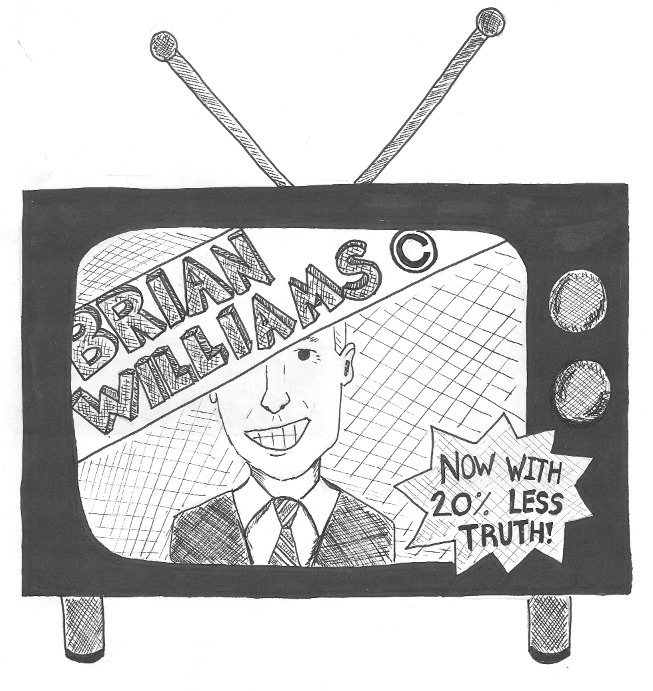Celebrity news anchors threaten national journalistic integrity
I could never be a professional news anchor, and it is not for want of better looks; nor is it for a lack of wit, charm and determination. Possibly already evident, it isn’t due to an absence of confidence either.
I could never be a professional news anchor because of the celebrity. Allow me to explain.
This February, famed NBC journalist and news anchor Brian Williams stepped out of his chair for several days following an admission that he incorrectly told a story from his time reporting on U.S. armed forces in Iraq. Williams claimed to have been on a helicopter struck by a rocket propelled grenade. Two days later, Williams was suspended by NBC for six months without pay. In December of 2014, Williams signed a five year contract with NBC reported to be worth $10 million a year. (To compare, David Muir, Anchor of ABC’s “ABC World News,” makes a reported $5 million a year; CBS’s Scott Pelley of “CBS World News” and “60 Minutes” makes a reported $7 million a year.) Williams’ program, “NBC Nightly News,” draws, on average, 9.3 million viewers a night.
It is here where something is intrinsically wrong with the state of television-journalism and news reporting today. In markets as large as those that networks like NBC, CBS and ABC command, anchors like Williams act as a public face to millions of people worldwide. More than that, anchors like Brian Williams, Scott Pelley and David Muir are brands.
Multi-million dollar network spending on talent like Brian Williams is an investment, like any investment, that is grounded in return; unfortunately, the level of return is fundamentally based on skills as separate from objective and qualified journalism as making horseradish. Take another look at the traits I listed at the beginning of this article. Do any of those qualities convey a prerequisite for capable news reporting? Wit and determination? Maybe. Looks, charm and confidence? Certainly not. However, they do appear to convey a certain predisposition for popularity, a disposition necessary to command the sort of audience required to carry the banner of a trusted primetime news program.
And it is that popularity and audience which today is as important, if not more important, to networks as the art of capable journalism. Steve Jobs, in the 1996 documentary Triumph of the Nerds, argued that those with the most power to influence the development of large conglomerates like Xerox were promoted to top positions within the company — no surprise there. The trouble Jobs found within massively dominant companies not unlike NBC, who faced little product differentiation between competitors, was that individuals who were involved in product development had little influence on the market-wide development of the company. Instead, sales and marketing people, those responsible for the popularity and public standing of the product, rose to the greatest importance, pushing out those responsible for the quality of the product itself.
“The companies forget what it means to make great products,” Jobs said. “The product sensibility and the product genius that brought them to that monopolistic position gets rotted out.”
When examining Jobs’ diagnosis, the state of network news conglomerates like NBC, CBS and ABC are the same as Xerox. The issue, if one chooses to view it as such, is that the current network system works. People are willing to invest their time into a well-packaged product. Network news programs like “NBC Nightly News” that founded their success on decisive programming like Walter Cronkite’s “CBS Evening News” in the 1960s and 70s underwent a tectonic shift in the past half century to best rebuild the sense of “the most trusted man in America,” not necessarily find a new one. This is not to say individuals like Williams, Muir and Pelley (especially Pelley) are not capable and experienced journalists; it is to highlight that their careers as major network anchors exist in a time where they do not have to be. Just because something looks like a duck, swims like a duck and sounds like a duck does not mean it is not a loon.
It is not surprising that Williams exaggerated his claims, just as it is not surprising that Williams, when informed of Leno’s vacated spot on The Tonight Show in 2009, requested to fill it. He is far more a product of his position than a primetime villain. His comments were not malicious; they were only made to embellish his shine. It is not unreasonable to speculate that NBC may never have suspended Williams if the controversy did not rear its head as quickly as it did. But when it did appear, it exposed, if only for a moment, the gross exaggeration of authority modern news anchors have come to project. Maybe permanently, Brian Williams the brand, ceases to work for NBC.
Perhaps Williams’ self-banishment was then too gross an exaggeration of his own importance; he is a face, another celebrity. Yet on that face, for the American people today, and even Williams himself, a simple blemish is enough to shatter the imagined infallibility of its expression.
Emma Pinsky is a senior and the managing editor of Deerprints. She joined Deerprints as a sophomore to pursue her interest in writing and it quickly became...






